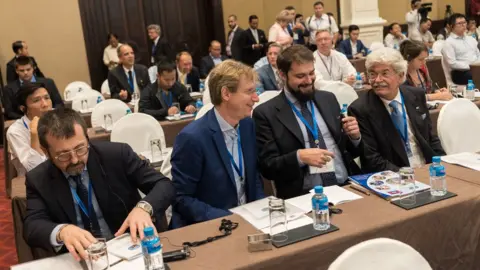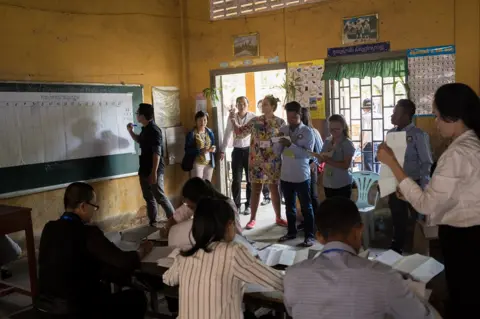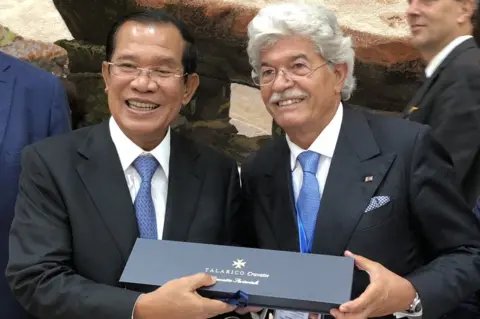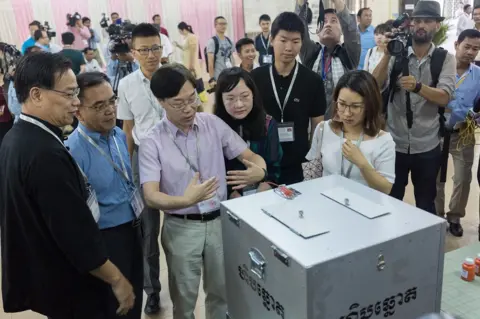The European populists monitoring 'sham' elections
 Thomas Cristofoletti/Ruom
Thomas Cristofoletti/RuomA group of European populist and nationalist politicians descended upon Cambodia last weekend to observe national elections - which they lauded with glowing reviews as being free and fair.
They were driven around in vans provided by a five-star hotel to seemingly predetermined polling stations, mostly confined to the capital, Phnom Penh.
Their remit was to observe the vote on election day and to make sure all procedures were carried out properly - which by all accounts they were. But they are facing criticism for ignoring the wider context - that the only viable opposition party has been dissolved and its leader is in jail.
For this reason the vote was not seen as credible by the European Union, United Kingdom and United States. But analysts say so-called "zombie monitors" are increasingly used to give regimes with troubled democratic records a veneer of respectability.
The vote, which saw Prime Minister Hun Sen's Cambodian People's Party (CPP) win all 125 seats in parliament and extend his 33-year rule, was derided by rights groups as a "sham".
The EU, the US and Japan - which have long lavished aid and electoral assistance on Cambodia - withdrew their observers. In their absence a group of populist, Eurosceptic, pro-Russia politicians from the UK Independence Party (Ukip), the Bulgarian Socialist Party, the Czech Freedom and Direct Democracy Party, the Austrian Freedom Party and an assortment of personalities from right-wing parties in Italy were paraded in front of the Cambodian press as "European Union observers".
"The opposition, I know nothing about it, my only job was to come here, see the election and report on the process, and that's what I've done," said Richard Wood, a Ukip member who deemed the election "free and fair".
 Thomas Cristofoletti / Ruom
Thomas Cristofoletti / RuomFormer Italian senator Antonio Razzi - who gained notoriety in his home country for heaping praise on Kim Jong-un and dismissing reports of concentration camps in North Korea as being simply "tomato greenhouses" - similarly brushed off the opposition's dissolution as "an internal affair in which we do not meddle".
While a handful of internationally respected observers were present at Sunday's vote, others such as the International Conference of Asian Political Parties have a track record of endorsing elections not only in Cambodia but also in countries like Azerbaijan, where space for opposition political activity has been "virtually extinguished" according to Human Rights Watch.
Among the observers were groups headed by the Romania-based Anton Caragea, a man who has been appointed a "goodwill ambassador" by Hun Sen.
Allow X content?

"It's a sad state of affairs when you have illiberal persons from around the world basically flocking to Cambodia to become cogs in Hun Sen's propaganda machine," said Human Rights Watch's Phil Robertson.
"I'm sure it's quite attractive to some people… who want to come to a foreign country and be treated like royalty and squired around just to smile for the cameras."
The monitors the BBC talked to mostly said their trips were self-funded or paid for by organisations outside Cambodia.
In past elections, local independent monitoring groups such as the Committee for Free and Fair Elections in Cambodia - which withdrew their participation in May - would deploy tens of thousands of monitors across the country and co-ordinate with the networks of international observers.
 Antonio Razzi
Antonio RazziFor Cambodian political analyst Meas Nee, their absence - and replacement with thousands of observers from a ruling party youth group - makes it difficult to verify any claims by the nominally independent National Election Committee, which after the dissolution of the CNRP was staffed almost entirely by pro-CPP figures.
He described the European observers as "tourists".
But any clear verdict on the vote is muddied by the fact that these invited monitors could argue that the actual procedural aspects of the vote - the administration of the polls and the counting of ballots - were sound, while ignoring the fact that the main opposition Cambodia National Rescue Party was disqualified and people in rural areas were pressured to cast ballots.
John McAuliff, executive director of the Fund for Reconciliation and Development, who has observed elections in Cambodia since 1993, said the absence of the opposition made the election problematic.
But he added that election monitors, including those from the US or EU, are in his opinion always coloured by some political agenda.
"People come with a variety of motives to play the professional role of observer," he said. "That's fine, governments have agendas and they don't fund them for the objective purpose of supporting democracy."
It just so happens that many of the foreign observers watching this vote have a world view that aligns with many senior members of the Cambodian government, who have long railed against a US-dominated international order and have accused Washington of conspiring with the opposition to launch a "colour revolution" against them.
 Thomas Cristofoletti / Ruom
Thomas Cristofoletti / RuomThe ruling CPP has historical links with Russia dating back to the Soviet era, and has moved firmly into the Chinese orbit in recent years.
"We are pro-Russia, anti-globalisation and anti-Americanisation," said Bogdan Tardea, a Moldovan Socialist Party MP monitoring the vote, adding that he hoped to "deepen ties" between his party and the CPP.
"The world is divided between traditionalists and globalist liberalists," he added.
The delegation of Italian politicians represented a little-known organisation called Kian, founded by MEP Fabrizio Bertot, who previously observed elections in Azerbaijan and the widely derided 2014 referendum in Crimea. Mr Bertot told the BBC that Russian political scientist Oleg Bondarenko had co-ordinated the invitations for European observers sent out by the Cambodian Ministry of Foreign Affairs.
Mr Bondarenko, who was identified as the director of the "Foundation for Progressive Policy", has appeared with several different institutional affiliations in a variety of pro-Russian news outlets espousing Vladimir Putin's foreign policy. He could not be reached for comment.
Allow X content?

While the presence of a group of populist European politicians turning up to certify polls in Cambodia is a relatively new phenomenon, it's a tradition at Russian election time, according to Anton Shekhovtsov, author of Russia and the Western Far Right.
He said that the kind of election observation that ignores the wider political context "especially involving far-right, far-left and generally pro-Moscow politicians and activists, is a long-established practice".
What's more, some of the individuals who observed the 2018 presidential elections in Russia also observed the elections in Cambodia.
And while some of the election group chose their words carefully as they sought to defend the vote, others were less bothered.
"I don't believe in free elections," said Mr Tardea.
